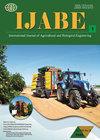改进YOLOv4-Tiny对圣女果的多类检测
IF 2.2
2区 农林科学
Q2 AGRICULTURAL ENGINEERING
International Journal of Agricultural and Biological Engineering
Pub Date : 2023-01-01
DOI:10.25165/j.ijabe.20231602.7744
引用次数: 2
摘要
快速准确的检测圣女果对实现机器人自动采摘具有重要意义。然而,到目前为止,检测到的圣女果只有一类可供采摘。被树枝或叶子遮挡的水果被检测为可采摘的物体,这可能会在采摘过程中对植物或机器人末端执行器造成损害。为了解决上述问题,本研究提出了基于YOLOv4-Tiny的Feature Enhancement Network Block (FENB)。首先,根据圣女果的分布特点和采摘策略,将圣女果夜间分为4类,白天分为未遮挡、树枝遮挡、果实遮挡和叶片遮挡;其次,采用带有混合注意机制的CSPNet结构设计FENB,在保留原有特征的同时,更加关注不同类别圣女果的有效特征;最后,基于特征增强网络构建特征增强网络(FEN),增强YOLOv4-Tiny的特征提取能力,提高检测精度。实验结果表明,在置信度为0.5的情况下,未遮挡、树枝遮挡、果实遮挡和叶片遮挡的果实在白天测试图像上的平均精度(AP)分别为95.86%、92.59%、89.66%和84.99%,在夜间测试图像上的平均精度(AP)分别为98.43%、95.62%、95.50%和89.33%。4个类别在夜间测试集的平均平均精度(mAP)(94.72%)高于白天测试集(90.78%),均优于YOLOv4和YOLOv4- tiny。在GPU上处理一个416×416图像需要32.22 ms。模型大小为39.34 MB,为圣女果的多类检测提供了一种实用可行的方法。本文章由计算机程序翻译,如有差异,请以英文原文为准。
Multi-class detection of cherry tomatoes using improved YOLOv4-Tiny
: The rapid and accurate detection of cherry tomatoes is of great significance to realizing automatic picking by robots. However, so far, cherry tomatoes are detected as only one class for picking. Fruits occluded by branches or leaves are detected as pickable objects, which may cause damage to the plant or robot end-effector during picking. This study proposed the Feature Enhancement Network Block (FENB) based on YOLOv4-Tiny to solve the above problem. Firstly, according to the distribution characteristics and picking strategies of cherry tomatoes, cherry tomatoes were divided into four classes in the nighttime, and daytime included not occluded, occluded by branches, occluded by fruits, and occluded by leaves. Secondly, the CSPNet structure with the hybrid attention mechanism was used to design the FENB, which pays more attention to the effective features of different classes of cherry tomatoes while retaining the original features. Finally, the Feature Enhancement Network (FEN) was constructed based on the FENB to enhance the feature extraction ability and improve the detection accuracy of YOLOv4-Tiny. The experimental results show that under the confidence of 0.5, average precision (AP) of non-occluded, branch-occluded, fruit-occluded, and leaf-occluded fruit over the day test images were 95.86%, 92.59%, 89.66%, and 84.99%, respectively, which were 98.43%, 95.62%, 95.50%, and 89.33% on the night test images, respectively. The mean Average Precision (mAP) of four classes over the night test set was higher (94.72%) than that of the day (90.78%), which were both better than YOLOv4 and YOLOv4-Tiny. It cost 32.22 ms to process a 416×416 image on the GPU. The model size was 39.34 MB. Therefore, the proposed model can provide a practical and feasible method for the multi-class detection of cherry tomatoes.
求助全文
通过发布文献求助,成功后即可免费获取论文全文。
去求助
来源期刊

International Journal of Agricultural and Biological Engineering
AGRICULTURAL ENGINEERING-
CiteScore
4.30
自引率
12.50%
发文量
88
审稿时长
24 weeks
期刊介绍:
International Journal of Agricultural and Biological Engineering (IJABE, https://www.ijabe.org) is a peer reviewed open access international journal. IJABE, started in 2008, is a joint publication co-sponsored by US-based Association of Agricultural, Biological and Food Engineers (AOCABFE) and China-based Chinese Society of Agricultural Engineering (CSAE). The ISSN 1934-6344 and eISSN 1934-6352 numbers for both print and online IJABE have been registered in US. Now, Int. J. Agric. & Biol. Eng (IJABE) is published in both online and print version by Chinese Academy of Agricultural Engineering.
 求助内容:
求助内容: 应助结果提醒方式:
应助结果提醒方式:


